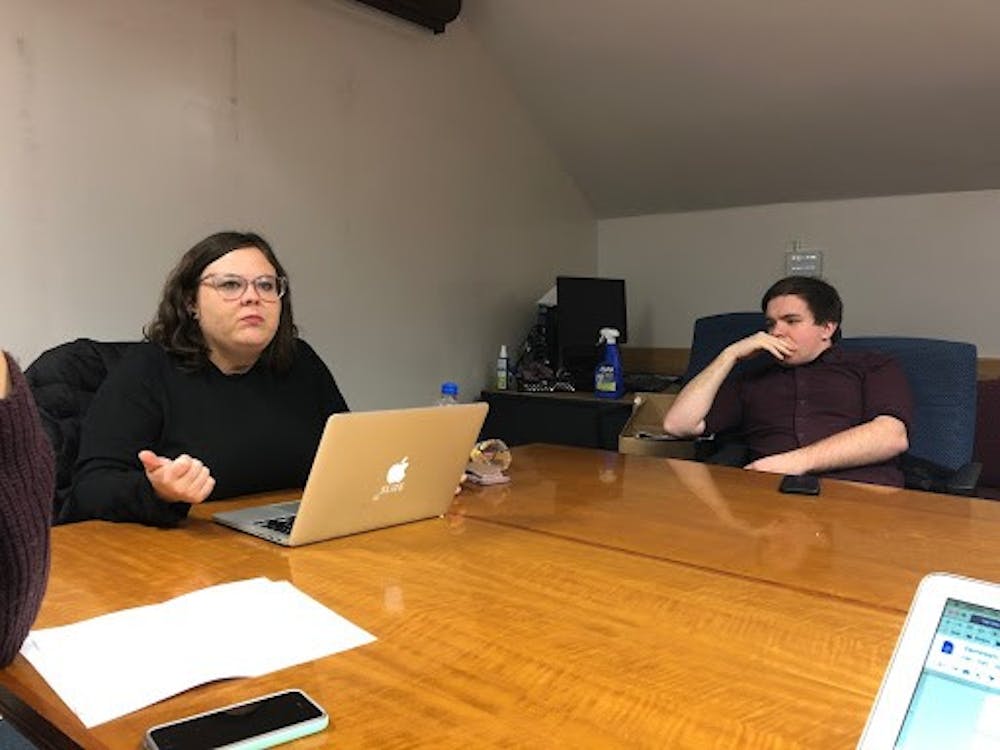In light of the upcoming International Women’s Day, Haley Swenson, a member of the International Socialist Organization (ISO), as well as Heba Islam of #JHToo, hosted “Feminism for the 99%” to discuss the future of socialist feminism and political organization on campus. Organized by the Baltimore chapter of the ISO, the event covered a range of topics — police brutality, sexual assault, job security and Hopkins contracts with Immigration and Customs Enforcement (ICE) — through a feminist lens.
In an effort to distinguish socialist feminism from liberal feminism, Swenson began by briefly describing the history of socialist feminism.
“The turn where people started becoming really concerned about delineating different political rights and roles for men and women is when there are have’s and have-not’s, because the question suddenly becomes about inheritance and who has a right to something,” she said. “So, control over women’s bodies and their sexualities takes over a socioeconomic importance.”
According to Swenson, feminists must first begin with tackling the ties between labor and capital.
“The fundamental relationship between labor and capital is where our right to live hinges,” she said. “Material reasons are why gender oppression gets recreated over the years, [and they] really help us understand what makes the engine run, as opposed to just focusing on individual men.”
However, she believes that today’s feminist wave is the most radical yet. Her first example was the annual Women’s Marches, which have been occurring since U.S. President Donald Trump’s election. She noted that the intersectionality of the Women’s March is part of what makes it such a powerful movement.
“It’s a lot of mixed politics but... there are seriously radical, intersectional feminist groups on the side contending for power,” she said. “It is radical that feminists see Black Lives Matter and pro-immigration efforts as part of their movement.”
She addressed how the #MeToo movement is contributing to the radicalization of feminism and the influence of socialist feminism across the electoral board.
“The #MeToo movement started in Hollywood, at the top echelons of society,” she said. “Now we’re getting people fired left and right. McDonald’s workers are on strike in response to sexual assault complaints. And now we are seeing more socialist women of color than ever on the election board... They’re changing the very face of who socialism is.”
Next, Islam spoke on behalf of #JHToo. Student activists organized the #JHToo movement in response to accusations of sexual assault against Anthropology Professor Juan Obarrio. As an organizer of #JHToo and a witness of the sexual assault, Islam explained how disappointment in the Title IX system galvanized the #MeToo movement.
“We’ve been taught to learn for so long to expect the system to fail us,” she said. “We initially tried to respond to the assault with the Title IX system, and then we realized it wasn’t going to work. Actually, we realized the system is successful when it didn’t work.”
Islam argued that such a system was what allowed Obarrio to act in such a way, despite being surrounded by witnesses. Islam and the rest of the #JHToo then turned to methods outside the Title IX system to protest Professor Obarrio’s tenure.
“Students are placed in an incredibly vulnerable power dynamic with their faculty,” she said. “It was time we stopped depending on those in power and started depending on ourselves.”
According to Islam, after months of posting about the University’s response, submitting sexual assault complaints and reaching out to the Baltimore Sun, the Krieger School of Arts & Sciences (KSAS) Dean’s Office responded that the administration would be prepared with an answer in three months. The Dean’s Office’s response allowed Islam to reflect on #JHToo’s experience of collective action at Hopkins.
“A lot of people told us to let it go, that trying to revoke tenure is a pipe dream and that we were risking our careers,” she said. “We’ve dealt with all kinds of exhausting conditions that chipped away at our mental health, our output as graduate students and our personal relationships too.”
Peter Weck, organizing committee member of Teachers and Researchers United (TRU), wondered how these experiences could translate into an institutional change that allows students to participate in collective action.
“At the union meeting, we had a good moment where we realized that the demands of #JHToo are part of the union’s demands now,” Weck said. “That’s one example of an institutional outcome and answers the question of what’s next. That’s one kind of manifestation of this broader realization that these are different battles in the same war. We need to make sure that all these connections happening.”





